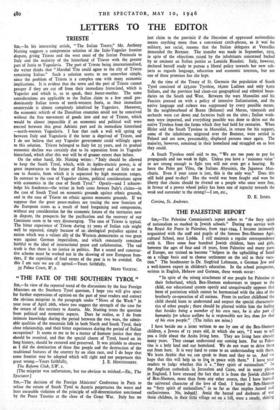LETTERS TO THE EDITOR
TRIESTE
SIR,—In his interesting article, " The Italian Treaty," Mr. Anthony Nutting suggests a compromise solution of the Italo-Yugoslav frontier dispute, giving Trieste and the west coast of the Istrian Peninsula to Italy and the majority of the hinterland of Trieste with the greater part of Istria to Yugoslavia. The port of Trieste being internationalised, the writer thinks that " Marshal Tito could agree to the city of Trieste remaining Italian." Such a solution seems to me somewhat simple, since the problem of Trieste is a complex one with mans economic implications. It is evident that the town and the port of Trieste cannot prosper if they are cut off from their immediate hinterland, which is Yugoslav and which is, so to speak, their foster-mother. The same considerations are applicable to the Italian claim to a few small pre- dominantly Italian towns of north-western Istria, as their immediate countryside is almost completely inhabited by Yugoslays. Moreover, the economic rebirth of the Danubian countries could not be conceived without the free movement of goods into and out of Trieste, which would be almost impossible if an economic and political wall were erected between this great Adriatic port and its immediate hinterland —north-western Yugoslavia. I fear that such a wall will spring up between Italy and Yugoslavia if the latter is deprived of Trieste, and I do not believe that any Yugoslav government could willingly agree to this solution. Trieste belonged to Italy for 25 years, and its gradual economic decline was certainly due to its separation from its Yugoslav hinterland, which after this war will be of greater extent than before.
On the other hand, Mr. Nutting writes: "Italy should be allowed to keep the South Tyrol, which, with its hydro-electric power, is of great importance to the future of Italian industry and of little or no use to Austria, from which it is separated by high mountain ranges. In contrast to the case of Yugoslav claims, political considerations agree with economics in the case of South Tyrol." Openly—and I acknow- ledge his frankness—the writer in both cases favours Italy's claims—in the case of South Tyrol on economic grounds against ethnic grounds, and in the case of Trieste on ethnic against economic grounds. If we suppose that the great peace-makers are tracing the new frontiers of the European states as a result of hard bargaining and compromise, without any consideration for the economic future of the territories now in dispute, the prospects for the pacification and the recovery of our Continent seem to be very discouraging. The case of Trieste is typical. The bitter experience of Trieste during 25 years of Italian rule might well be repeated, simply because of an ideological prejudice against a nation which was a valiant ally of the Western democracies in two great wars against German imperialism, and which constantly remained faithful to the ideal of international peace and collaboration. The sad truth is that there is no justice in politics. But a sound and construc- tive scheme must be worked out in the drawing of new European fron- tiers, if the repetition of fatal errors of the past is to be avoided. On this I am sure we are all agreed.—Yours faithfully,


























 Previous page
Previous page